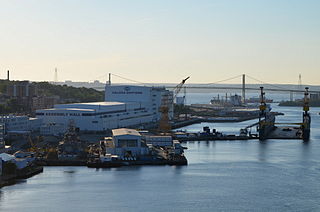Vickers is a famous name in British engineering that existed through many companies starting in 1826.
Contents
Vickers may also refer to:
Vickers is a famous name in British engineering that existed through many companies starting in 1826.
Vickers may also refer to:

Vickers was a British engineering company that existed from 1828 until 1999. It was formed in Sheffield as a steel foundry by Edward Vickers and his father-in-law, and soon became famous for casting church bells. The company went public in 1867, acquired more businesses, and began branching out into military hardware and shipbuilding.

The British Aircraft Corporation (BAC) was a British aircraft manufacturer formed from the government-pressured merger of English Electric Aviation Ltd., Vickers-Armstrongs (Aircraft), the Bristol Aeroplane Company and Hunting Aircraft in 1960. Bristol, English Electric and Vickers became "parents" of BAC with shareholdings of 20%, 40% and 40% respectively. BAC in turn acquired the share capital of their aviation interests and 70% of Hunting Aircraft several months later.

Hawker Siddeley was a group of British manufacturing companies engaged in aircraft production. Hawker Siddeley combined the legacies of several British aircraft manufacturers, emerging through a series of mergers and acquisitions as one of only two such major British companies in the 1960s. In 1977, Hawker Siddeley became a founding component of the nationalised British Aerospace (BAe). Hawker Siddeley also operated in other industrial markets, such as locomotive building and diesel engine manufacture. The company was once a constituent of the FTSE 100 Index.
Vickers-Armstrongs Limited was a British engineering conglomerate formed by the merger of the assets of Vickers Limited and Sir W G Armstrong Whitworth & Company in 1927. The majority of the company was nationalised in the 1960s and 1970s, with the remainder being divested as Vickers plc in 1977.

Vickers Shipbuilding and Engineering Limited (VSEL) was a shipbuilding company based at Barrow-in-Furness, England that built warships, civilian ships, submarines and armaments. The company was historically the Naval Construction Works of Vickers Armstrongs and has a heritage of building large naval warships and armaments. Through a complicated history the company's shipbuilding division is now BAE Systems Submarine Solutions and the armaments division is now part of BAE Systems Land & Armaments.
Armstrong may refer to:
Armstrong Siddeley was a British engineering group that operated during the first half of the 20th century. It was formed in 1919 and is best known for the production of luxury vehicles and aircraft engines.

Sir W G Armstrong Whitworth & Co Ltd was a major British manufacturing company of the early years of the 20th century. With headquarters in Elswick, Newcastle upon Tyne, Armstrong Whitworth built armaments, ships, locomotives, automobiles and aircraft.

Swan Hunter, formerly known as Swan Hunter & Wigham Richardson, is a shipbuilding design, engineering, and management company, based in Wallsend, Tyne and Wear, England.
The Marconi Company was a British telecommunications and engineering company that did business under that name from 1963 to 1987. Its roots were in the Wireless Telegraph & Signal Company founded by Italian inventor Guglielmo Marconi in 1897, which underwent several changes in name after mergers and acquisitions. The company was a pioneer of wireless long distance communication and mass media broadcasting, eventually becoming one of the UK's most successful manufacturing companies. In 1999, its defence equipment manufacturing division, Marconi Electronic Systems, merged with British Aerospace (BAe) to form BAE Systems. In 2006, financial difficulties led to the collapse of the remaining company, with the bulk of the business acquired by the Swedish telecommunications company, Ericsson.
Hyundai is a South Korean industrial conglomerate ("chaebol"), which was restructured into the following groups:

The Aircraft and Shipbuilding Industries Act 1977 is an Act of the Parliament of the United Kingdom that nationalised large parts of the UK aerospace and shipbuilding industries and established two corporations, British Aerospace and British Shipbuilders (s.1).

VTG (formerly VT Group) is a privately held United States defense and services company, with its origins in a former British shipbuilding group, previously known as Vosper Thornycroft. The British part of VTG was integrated into Babcock International in the early 2010s. In July 2012, The Resolute Fund II, LP, an affiliate of The Jordan Company acquired VTG. In September 2023, VTG received a new majority investment from A&M Capital Partners.

Vickers plc was the remainder of Vickers-Armstrongs after the nationalisation of three of its four operating groups: aviation, shipbuilding and steel. It was purchased by Rolls-Royce plc in 1999, and the Vickers company name became defunct in 2003 as Rolls renamed the company Vinters Engineering.
Vickers Limited was a British engineering conglomerate. The business began in Sheffield in 1828 as a steel foundry and became known for its church bells, going on to make shafts and propellers for ships, armour plate and then artillery. Entire large ships, cars, tanks and torpedoes followed. Airships and aircraft were added, and Vickers jet airliners were to remain in production until 1965.
Canadian Vickers Limited was an aircraft and shipbuilding company that operated in Canada during the early part of the 20th century until 1944. A subsidiary of Vickers Limited, it built its own aircraft designs as well as others under licence. Canadair absorbed the Canadian Vickers aircraft operations in November 1944.
Rolls-Royce may refer to:

The Halifax Shipyard Limited is a Canadian shipbuilding company located in Halifax, Nova Scotia.

The Port of Barrow refers to the enclosed dock system within the town of Barrow-in-Furness, England. Morecambe Bay is to the east of the port and the Irish Sea surrounds it to the south and west. The port is currently owned and operated by Associated British Ports Holdings, but some land is shared with BAE Systems Submarine Solutions. Currently consisting of four large docks, the Port of Barrow is one of North West England's most important ports. The docks are as follows: Buccleuch Dock, Cavendish Dock, Devonshire Dock and Ramsden Dock. The port of Barrow is the only deep water port between the Mersey and the Clyde.